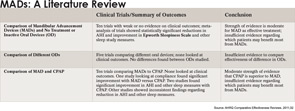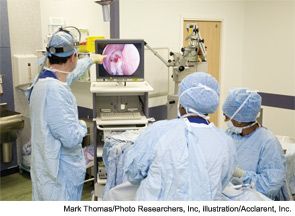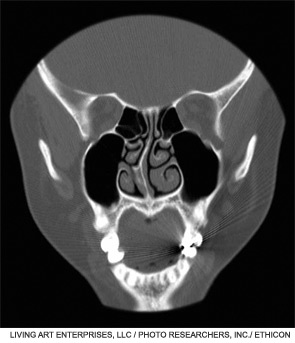Oral appliances may work better than CPAP for some patients


Oral appliances may work better than CPAP for some patients

What’s more important, your computer’s hardware or its software? You tell me: What’s more important, your heart or your lungs? Obviously, if you’re going to function, you need both. The same is true for electronic medical record (EMR) and electronic health record (EHR) software: Your hardware is mission-critical to the success of your electronic records, and this is not the place to compromise.

Six years after balloon sinuplasty was introduced to the otolaryngology community, it remains an evolving technology. “In my opinion, balloon dilatation has great potential, but it’s still trying to find its proper place in the ENT arena,” said Ralph Metson, MD, clinical professor of otology and laryngology at Harvard Medical School and Massachusetts Eye and Ear Infirmary in Boston.

In my last column (ENT Today, August 2011), I explained some of the broader issues regarding electronic medical records/electronic health records (EMR/EHR) selection, centered around the understanding that an EMR is a record that is more practice centered while an EHR is a health record intended to follow the patient through multiple providers. This article is directed toward practices with a large degree of autonomy in selecting their products; therefore, we will be discussing EMRs. If you’re part of a multidisciplinary practice or a university, you likely had little to no input regarding the EHR chosen. This is because larger numbers like primary care drive EHR selection. Don’t stop reading, however; assessment of disease-specific pathways is still applicable for the EHR you have.

The biggest gains in the future for surgical and therapeutic treatments of head and neck cancer will likely include the use of imaging techniques, radio-enhancers and drug delivery vehicles that are really, really small.

I have been working with electronic medical records (EMR) for many years, having first become interested in 1996, when I was looking for a tool to collect data for pediatric sinusitis. As we designed a product to collect this data, our scope expanded into developing a subspecialty-specific EMR. I have since learned a great deal about developing and codifying information and am currently participating in my third and largest implementation of an EMR at Boys Town National Research Hospital in Omaha, Neb. In this column, I would like to discuss what to look for in an EMR and give some initial thoughts on implementation.

For patients who undergo septoplasty to repair a crooked septum, reconnecting pieces of cartilage and stabilizing the cartilage during the healing process is critical to achieving straight alignment of the nasal septum. Stabilizing cartilage is particularly challenging for patients who require correction of severe septal deviations or severe post-traumatic deformities that are often both functional and cosmetic.
The large, roadside billboards advertised robotic surgery in bright, bold colors, something that struck David Eibling, MD, professor of otolaryngology at the University of Pittsburgh, as “fundamentally wrong.” Hospitals and physicians “should not be offering robotic surgery as a draw for patients,” said Dr. Eibling, who noticed the billboards while traveling through Florida earlier this year, “but rather as a potential tool to benefit the care of the patient.”
Dr. Johnson gave the presentation at COSM 2011.

Chemoradiation therapy (CRT) for head and neck cancer is overused at some centers in patients with early-stage laryngeal cancer, and more care should be taken not to overtreat patients with therapy that can have toxic effects, said invited lecturer Jonas Johnson, MD, at the Annual Meeting of the Triological Society, held here on April 29 as part of the Combined Otolaryngology Spring Meetings.